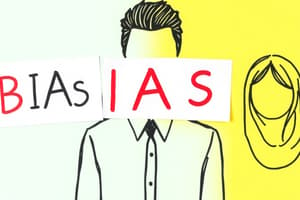Podcast
Questions and Answers
What is discrimination?
What is discrimination?
- Making incorrect assumptions about individuals
- Giving equal opportunities to all individuals
- Treating someone unfairly based on their group or category (correct)
- Complimenting people based on their appearance
What is stereotyping?
What is stereotyping?
- Treating everyone the same despite differences
- Providing unbiased feedback to individuals
- Associating certain traits with specific groups of individuals (correct)
- Avoiding making assumptions about others
What are microaggressions?
What are microaggressions?
- Subtle acts or comments reflecting biases (correct)
- Equal treatment for all individuals
- Encouraging diversity and inclusion
- Overt and direct acts of discrimination
How do microaggressions contribute to perpetuating inequalities?
How do microaggressions contribute to perpetuating inequalities?
What does social justice aim to achieve?
What does social justice aim to achieve?
How does prejudice contribute to inequality?
How does prejudice contribute to inequality?
Flashcards are hidden until you start studying
Study Notes
Bias and Prejudice
Bias and prejudice are deeply rooted in our human nature, affecting how we perceive others based on their appearance, beliefs, behaviors, and many other aspects. These attitudes can lead to discrimination, a practice of treating someone unfairly because they belong to a particular group or category. Stereotyping is another expression of bias where people associate certain traits with specific groups of individuals. For instance, a person might assume all women are good at cleaning or all men are bad drivers without any evidence supporting these generalizations.
Microaggressions are more subtle forms of biases where people make comments or commit acts against others due to their prejudicial views. Examples could range from racist jokes to unintentionally using incorrect pronouns when referring to transgender individuals. Microaggressions often go undetected by those committing them since they may think they're complimentary. However, such actions contribute significantly to perpetuating inequalities among different groups within society.
Prejudice leads to unequal treatment for many reasons; one being economic advantage gained through exploitation of minority populations. Inequality arises from this unfairness experienced by some sections of the population over time. Social justice aims to create fairer opportunities for everyone regardless of race, gender, sexual orientation, class, physical ability, etc., thereby reducing inequalities in societies worldwide. It involves addressing root causes of issues like poverty, unemployment, illiteracy, etc., which disproportionately affects marginalized communities.
In summary, understanding various types of biases - including conscious or unconscious ones - helps us recognize potential challenges associated with relying solely upon first impressions rather than objective evaluations. By recognizing these forms of prejudice, we can work towards creating inclusive environments and promoting social justice, ensuring equal opportunities for all members of society.
Studying That Suits You
Use AI to generate personalized quizzes and flashcards to suit your learning preferences.




